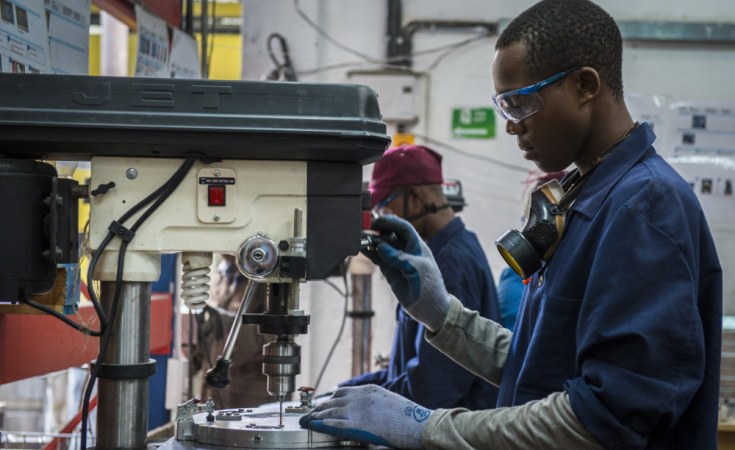When it comes to Africa, President Obama's mantra has always been "trade not aid." Two years ago he put that idea into practice at the first U.S. – Africa Business Forum, which drew $33 billion in support from the government and industry to help grow the economies of Africa.
The president spoke at the forum again this week in New York during the meeting of the U.N. General Assembly to celebrate the accomplishments of past two years.
"Everywhere I've gone … Africans insist they do not just want aid, they want trade," Obama said. "They want partners not patrons. … The United States is determined to be that partner — for the long term — to accelerate the next era of African growth for all Africans."
A key part of the campaign has been partnering with global companies to encourage more investment, education and job growth in Africa. GE has been in Africa for more than a century, since opening one of its first offices outside the United States in Johannesburg, South Africa in 1898. As a company that not only builds everything from locomotives to power stations to healthcare products, (and has the ability to arrange financing for everything from jet engines to medical imaging machines) GE was well positioned to be a partner in the government's initiative.
So two years ago GE committed to invest $2 billion across Africa by 2018. GE Africa's Chief Executive Jay Ireland says the company has made significant progress on that commitment.
For example, GE opened the Africa Innovation Centre in South Africa in 2016. Ireland says the collaborative work space is aimed at "driving innovation in Africa for Africa." Since 2014, GE has also upgraded its facilities in South Africa and Nigeria, opened new operations in Kenya and Ghana and opened offices in Ethiopia, Mozambique, and Cote d'Ivoire. GE now employs more than 4,100 staff in 35 African countries.
Earlier this year GE opened the $13 million GE Healthcare Skills and Training Institute in Kenya as part of a commitment to train over 10,000 healthcare professionals in East Africa by 2020. GE has upgraded radiology departments at 96 public hospitals in Kenya, increasing access to the vital machines by as much as 50 percent in pilot programs.
The company has also sponsored contests aimed at finding the best new ideas. This month, GE and Egypt's Ministry of Communications and IT launched the GE Egypt Digital Innovation Challenge for entrepreneurs to submit digital solutions to challenges in healthcare, transportation and energy. Winners receive training and a prize of EGP 100,000 ($11,000), as well as the chance to develop their software on GE's cloud-based Predix platform for the Industrial Internet.
GE has also renewed its commitment through 2017 to fund, with the U.S. Africa Development Foundation and USAID, the "Power Africa Off-Grid Energy Challenge" to give grants of up to $100,000 each to local companies that develop ways to get electricity to hard-to-reach places in Ethiopia, Ghana, Kenya, Liberia, Nigeria, Tanzania, Rwanda, Uganda and Zambia. The initiative has already awarded 50 grants worth $5 million. Since 2014, GE has added about 11 gigawatts to the electric grid, enough electricity to power nearly 11 million African homes.
Nabil Habayeb, GE's chief executive for the Middle East, North Africa and Turkey says the firm's focus in North Africa is bolstering energy, healthcare and transportation infrastructure. "Our emphasis has been to create thriving innovation ecosystems," says Habayeb.
For more information about progress on GE's projects and partnerships undertaken in Africa since 2014, click here.
This article was first published at GE Reports


